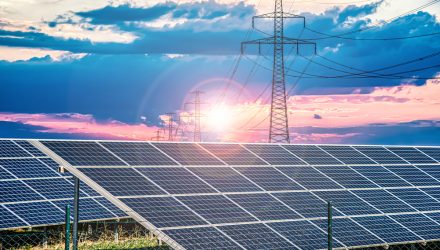The ALPS Clean Energy ETF (ACES) rallied around 16% in January as clean energy stocks advanced on quarterly earnings and event-driven news.
With geopolitical tensions spurring the need for global energy security and accelerating the adoption of clean energies, ACES’ focused allocation to U.S. and Canadian pure-play companies minimizes the high leverage and transparency risk associated with Chinese and European clean energy companies, allowing it to vastly outperform the S&P Global Clean Energy Index in January, SS&C ALPS Advisors wrote in an insight on February 1.
While ACES climbed 16% in January, broader markets, as measured by the SPDR S&P 500 ETF Trust (SPY), climbed 6.29% on a total return basis.
Looking ahead, geopolitical risks and elevated fuel costs will continue to advance energy transition spending and adoption over the next few decades. The estimated $194 trillion investment effort to reach Net-Zero by 2050 goals is a global opportunity that is just beginning, according to ALPS.
“Public, corporate and consumer spending towards clean energy will be driven by massive tax credits and subsidies across the G20 nations, including further credits set to kick in during 2023 from the US Inflation Reduction Act (IRA) passed in 2022,” ALPS wrote. “Since the IRA bill passed, nearly $28 billion in new EV infrastructure investment has been announced in the US, with the announced policy support raising estimates of US grid investment alone to $801 billion by 2030.”
The act has ignited M&A activity across the EV and U.S. biofuel industries, with fossil-fuel buyers flush with free-cash-flow looking to reposition their businesses toward more clean technologies and ESG attributes.
While higher financing costs for solar, wind, and hydrogen projects is a concern for 2023, lower material costs and tax credits should flow through those supply chains this year to help offset the high interest rate environment.
ACES is diversified within seven sub-segments of clean energy, which has helped the fund navigate near-term headwinds on rising rates. The fund is overweight to Fuel Cell/Hydrogen and Energy Management & Storage, which are projected to see investment grow 64.1x and 6.1x by the end of the decade, according to ALPS.
For more news, information, and analysis, visit the ETF Building Blocks Channel.








